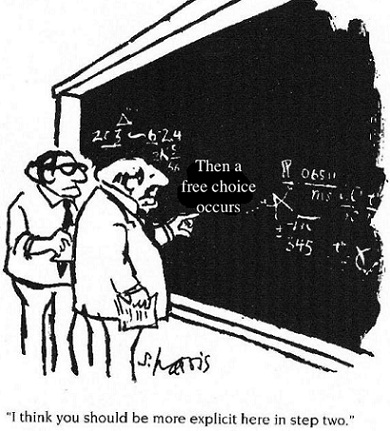A common philosophical question revolves around the existence of free will, but these debates gloss over the concept of "free will" itself, either taking it as a given (that everyone understands what the term really means), or proceeding with a murky and unspecific definition. Have there been attempts to provide a rigorous, mathematical definition of what specific conditions would constitute a free choice? What are the necessary conditions for an action to be regarded as a free choice, rather than a determined one?
This doesn't have to be confined to a particular world. The formalized explanation of "free will" could be valid in any kind of world, where the laws of "physics" can be different from the ones in our world, and where one could point to a process which would constitute a free choice.
For comparison, there is a mathematical explanation of a deterministic will. Conway's Game of Life constitutes a world where for any process or change in state, you can point to it as a deterministic process, because it is rule-bound, and the future is predictable from the current state. What change would I have to do to be able to point to a process and say that it was a free process?
When these processes are involved in a choice, the determinacy of the choice inherits the determinacy of the process. If a brain makes a choice, and the brain is contained within a deterministic universe, the choice itself becomes deterministic. How could one constitute a universe so the processes behind the choice were constituted in such a way that the choice would become free?
The reason for me asking is that I always find myself dissatisfied with the definitions of "free will" I get, just as I never can wrap my head around the concept of objective values. It's just something you're supposed to intuitively have a concept of and if you don't, you seem to be on your own.
If I speak to somebody who doesn't know what "deterministic" means, I can give a precise, clear, mathematical definition. Since the free will-claim is on a direct collision course with determinism, all I want is for someone in the free will-camp to return the favor. So far, this hasn't happen and since I can't begin to understand what "free will" would be, I haven't been able to produce anything myself.
I'm not asking how one could look at the outcome of a system and decide whether it was generated by free choice or not. I'm also not looking for a proof of free will. I'm simply asking for a way that it could be implemented in some possible world, regardless of whether that is actually the case. We can do this in regard to determinism, for example, without also saying that the world works deterministically (e.g the statement "if every state of the world is fully determined by the previous state, the world is deterministic" doesn't imply that the world also works deterministically).
To better 'illustrate' my point (with the help of Sidney Harris):

